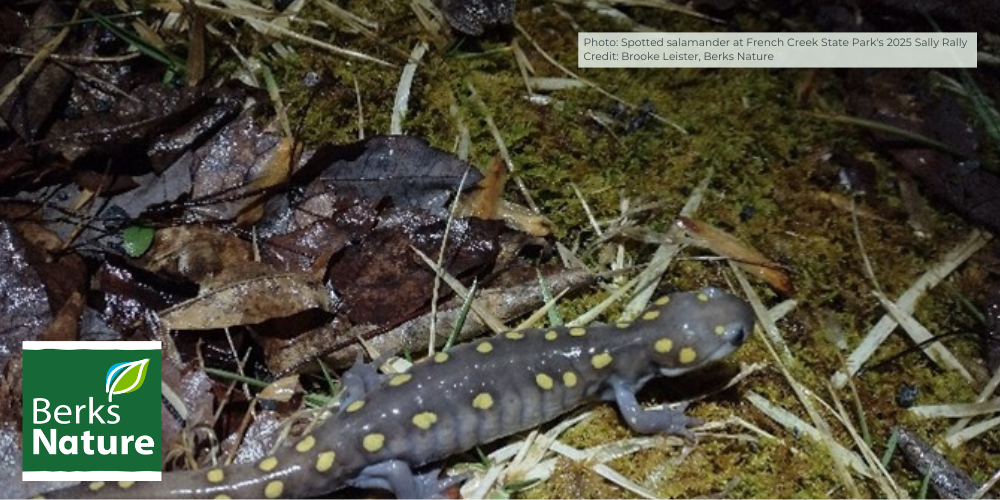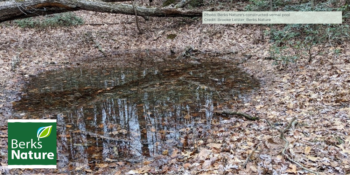
On a dreary, wet night in early spring, dozens of volunteers can be found armed with headlamps and clipboards scouring the roadways of French Creek Sate Park. They are looking for amphibians crossing the road, so that they may shepherd them to their ancestral breeding pools on the other side. This is the annual and wildly popular Sally Rally.
French Creek State Park is located in the Hopewell Big Woods, overlapping the boarder of northern Chester County and southern Berks County along the French Creek The main road leading into the park is unique in that it is flanked on both sides by a network of vernal pools – shallow, seasonal wetlands that fill with snowmelt and rainwater each spring but dry up come summer. To the untrained eye, vernal pools appear as large, unremarkable puddles of still, murky water. But for the amphibians of French Creek State Park, vernal pools are both a homecoming and a new beginning for the next generation.
Amphibians like frogs, toads, and salamanders use vernal pools as both a breeding ground and a nursery for their young. Due to their temporary nature, vernal pools lack fish, which would otherwise eat amphibian eggs, making them relatively safe places to start a family. Amphibians remain faithful to their natal pools, returning each year to the very pool in which they were born.
Thus, each spring, French Creek State Park’s main road becomes a major thoroughfare for frisky amphibians returning home. To encourage safe passage of the amphibians, volunteers gather on nights with a high likelihood of activity – mild temperatures and rainy skies – to escort the frogs, toads, and salamanders across the road. Spotted salamanders are the star of the show; large salamanders growing up to 10 inches long whose gray skin is speckled with their bright yellow spots. For many, this event is the first time seeing these critters in person. It is an incredible way to be introduced to these species and the distinctive ecosystem they rely on.
Despite their humble appearance, vernal pools play a critical role in the life cycle of many amphibians and provide habitat for other aquatic organisms, even fairy shrimp! Unfortunately, these critical habitats are declining in number due to development and loss of woodland, pollution, and vegetation loss along these and other wetlands. According to Penn State Cooperative Extension, the loss of vernal pools is directly linked to an observed decline in species dependent on these habitats.

As crucial as it is to protect and conserve the remaining, naturally occurring vernal pools in our landscapes, creating new vernal pool systems can also support native biodiversity. In the fall of 2024, Berks Nature, with funding provided by Pennsylvania American Water, spearheaded a project to create a vernal pool on their Neversink Mountain Preserve, an almost 1000-acre preserve located just northwest from the spotted salamander haven at French Creek State Park.
While the newly constructed pool is a boon for local wildlife, its presence is also expected to assist with stormwater mitigation and erosion. Berks Nature installed the vernal pool on a decommissioned trail that had severe erosion issues by redirecting the flow of stormwater towards an existing wet spot. A berm was built and stabilized with a cover crop of native deer tongue and black-eyed Susan to encourage the stormwater to collect in the depression and slowly infiltrate into the ground, instead of rapidly flooding the mountain’s slope. This new dynamic will also benefit the local wetland seeps and baseflow of the Klapperthal Creek below, which is a tributary of the Schuylkill River.
Berks Nature intends to monitor this new pool to quantify its success both as a refuge for amphibians and as a stormwater mitigation measure. In partnership with AquaTerra Environmental and Albright College two monitoring wells equipped with data loggers to track water levels and environmental conditions have been installed at the new pool, providing real-world data for wildlife management and water quality.
While rain levels this year have been low, there is some water in our pool, albeit no critters yet. But Berks Nature maintains hope that with time this new pool will be discovered and colonized by vernal pool-obligates seeking new safety and a fresh start. Due to the sensitivity of this habitat the vernal pool area will not be open to the public. This new sanctuary will exist for educational purposes and most importantly, a sensitive breeding habitat for our amphibious friends.